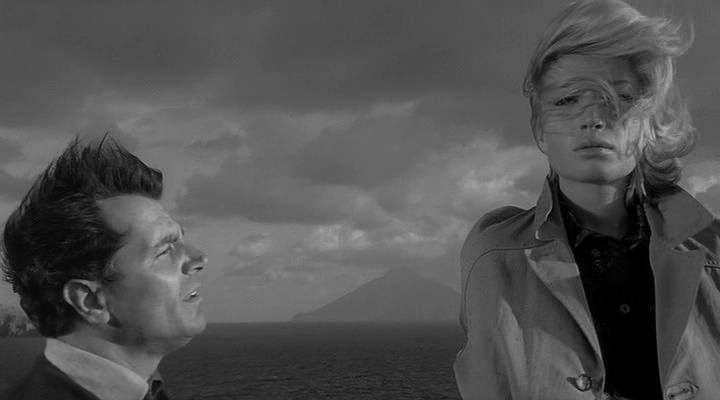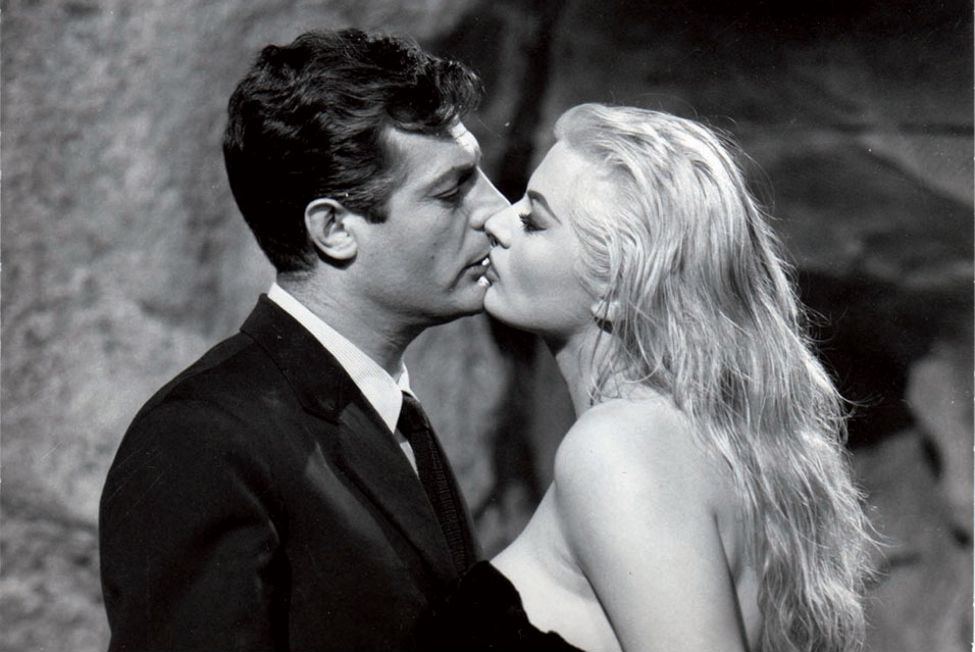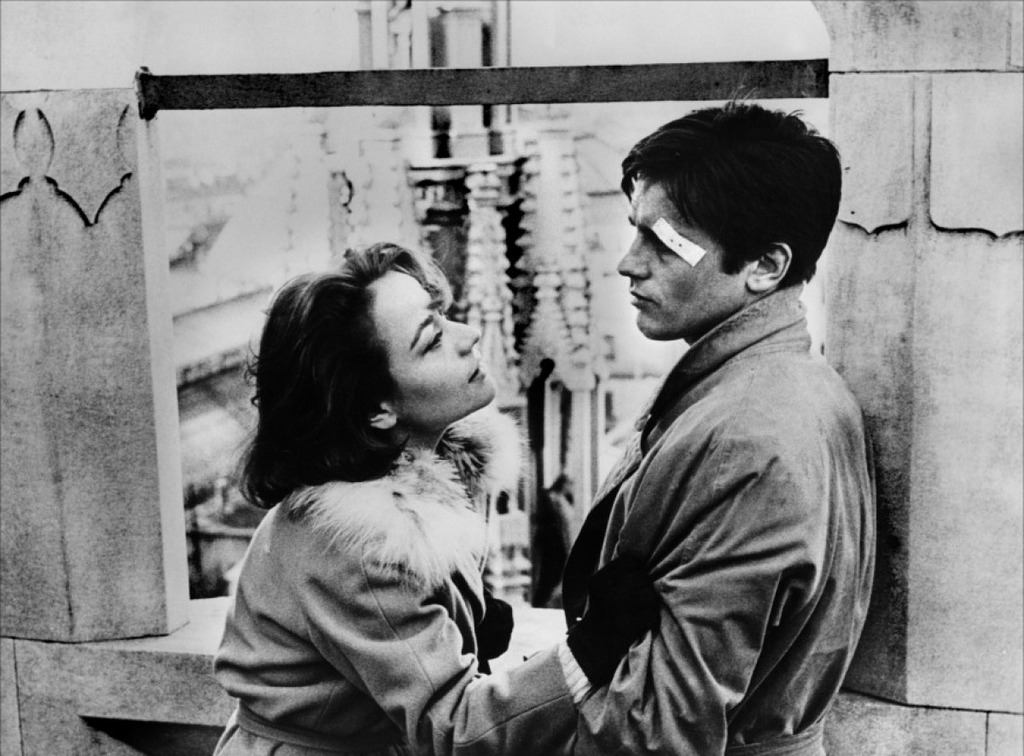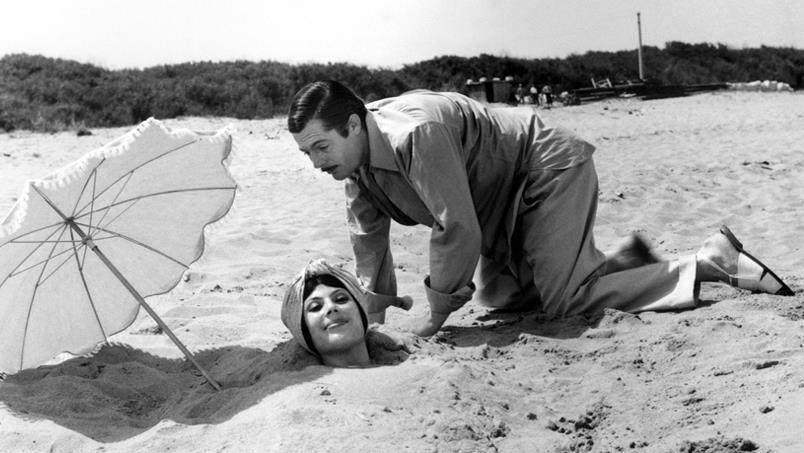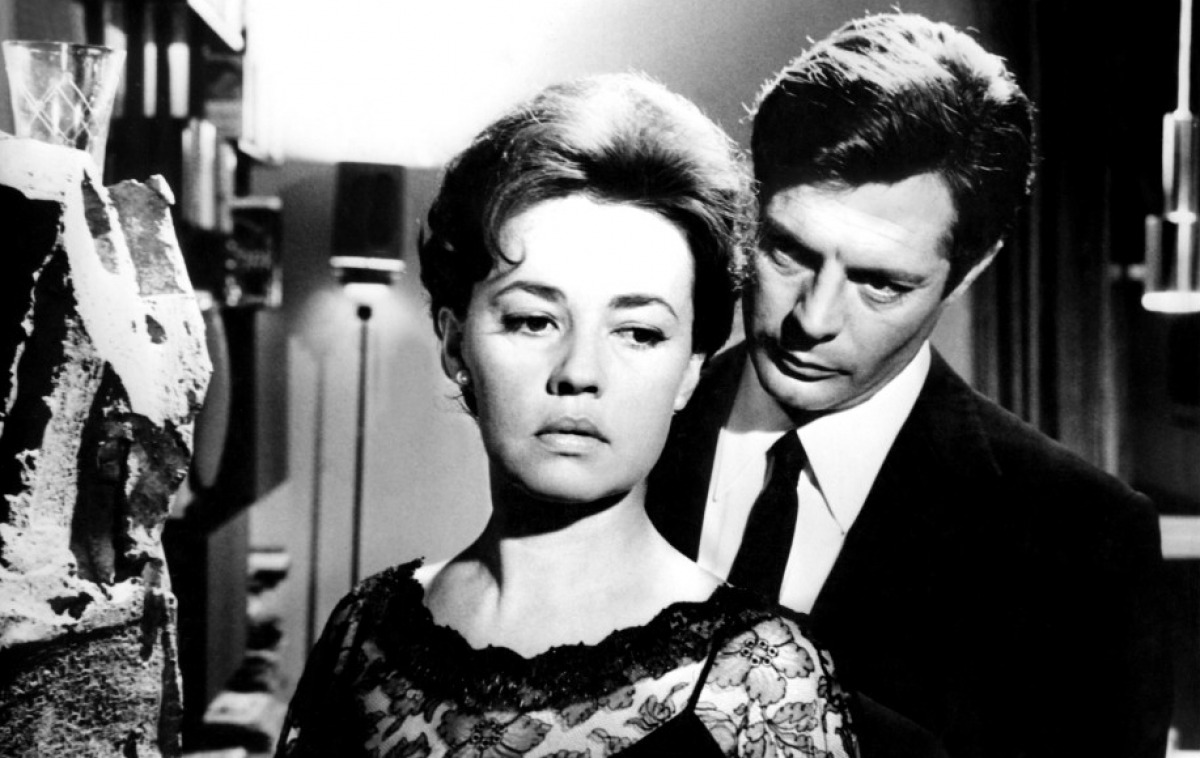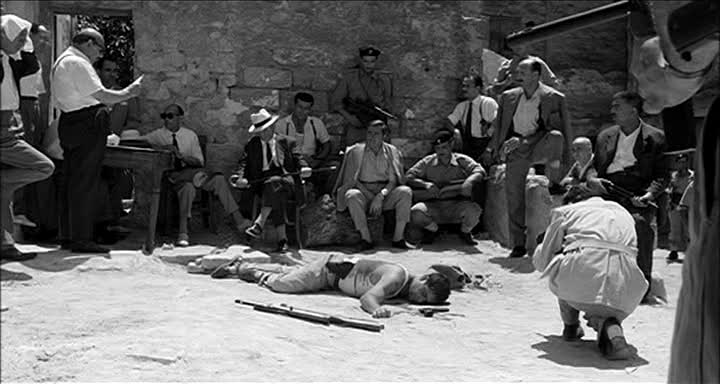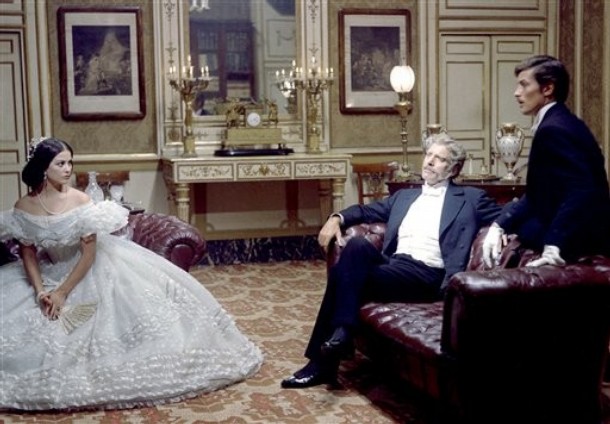8. L’Avventura (Michelangelo Antonioni, 1960)
L’Avventura is largely considered Antonioni’s masterpiece and its condemnation of contemporary emotions has gone unmatched in its devastation and power. The film cleverly starts as a mystery surrounding the disappearance of a girl during an outing with friends.
As the film goes on, however, the importance of this events fades into complete obscurity as her friends quickly forget her existence and her best friend and fiance start a relationship. Inevitably, all of the relationships in the film, disintegrate leaving a trail of wounded souls.
The first film in Antonioni’s “modernity” trilogy is both the most accessible and most powerful of the three. The relative indifference that the characters show towards events convey the shallowness that society and culture has fallen to. The initial intrigue of the plot that quickly fades mirrors the superficial image of modernity.
Despite an uneventful plot and a lengthy run time, L’Avventura is riveting all the way up until its final, devastating shot. With striking and personal cinematography as well as dedicated performances from the Gabriele Ferzetti and Monica Vitti, Antonioni’s incredible film is one of the most insightful critique of the human condition.
9. La Dolce Vita (Federico Fellini, 1960)
One of Fellini’s most revered masterpieces stars Marcello Mastroianni as Marcello Rubini, a gossip journalist who reports on the famous citizens of Rome.
The film itself has a rather loose storyline, simply following Marcello through a week of his exploits and adventures throughout Rome while he looks for happiness, without knowing what he wants. He interacts with several colorful characters along the way like the beautiful Sylvia and the intrusive reporter Paparrazzo (who inspired the now common term), but he does not maintain solid relationships with anyone, remaining lonely.
In English, La Dolce Vita means “the good life” which is referring to the way that the upper class characters of the film live. Fellini is commenting on this supposedly great lifestyle by juxtaposing the glamour with the exciting, but ultimately empty existence. Lavishly produced and shot, the film succeeds both in terms of compelling content and artistic execution.
Fellini explores both societal and personal themes seamlessly through the unconventional narrative structure without being tied down to resolving a plot. One of the most famous and acclaimed European films ever, La Dolce Vita is an engrossing, witty and emotional commentary on class and the search for purpose in life.
10. Rocco and His Brothers (Luchino Visconti, 1960)
Rocco and His Brothers, often considered the greatest film of Visconti’s career, perfectly balances his trademarks of realism and melodrama. The film follows Rocco, played by Alain Delon, and his four brothers as they interact with each other and in urban Italy, after moving from the countryside.
All of the brothers have different experiences and transformations from the change in environment. When his brothers start to feud and travel down the wrong paths, Rocco acts as the force keeping his family together, sacrificing love, money and opportunities so that his brothers can succeed.
Operatic, gritty and powerful, Visconti’s film addresses many important themes of varying topic, including family dynamics, city versus rural life and the importance of self sacrifice. Filmed in black and white, with the grungy feel of his earlier work but features operatic, passionate relationships like his later films. His vision is undisturbed in this challenging and commanding odyssey of human emotion.
A quintessential entry in not only Visconti’s work but a landmark in all of Italian film, Rocco and His Brothers is a must see for every fan of Italian cinema.
11. Divorce Italian Style (Pietro Germi, 1961)
This hilarious an topical film, which gave name to the Italian style comedy film movement, stars Marcello Mastroianni as Ferdinando who is in an unhappy marriage to his unattractive wife Rosalia.
Ferdinando is smitten with his younger and much more beautiful cousin Angela, and when he finds out his feelings are reciprocated, he begins to scheme. In order to get motive to kill his wife (divorce was not an option), Ferdinando searches out a man who she will have an affair with so that he would have a sympathetic cause, although Rosalia’s seemingly undying love for him makes this harder than he hoped.
Skillfully written and directed by Pietro Germi, Divorce, Italian Style is filled with funny and dark humor. The colorful characters and unpredictable plot, along with great performances make it one of the most original and witty Italian comedies. The plot, making a joke of such serious content was both daring and controversial, making it an extremely influential film for Italy.
Mastroianni, in one of his greatest performances, is able to take the challenging material and make it hilarious, making the film an Italian classic. A hit both commercially and critically, Divorce, Italian Style was revolutionary in the development of Italian comedy and satire, causing many imitators following.
12. La Notte (Michelangelo Antonioni, 1961)
Made in the middle of Antonioni’s “modernity” trilogy that also includes L’Avventura and L’Eclisse, La Notte is similarly focused on internal relations of humans. Marcello Mastroianni and Jeanne Moreau star as the main couple Giovanni and Lidia. Giovanni is a successful writer and Lidia is a rich heiress and their marriage has fallen apart due to Giovanni’s self-proclaimed crisis.
The plot is loose, following them in a series of events showing their disintegrating relationship. Giovanni is constantly running off to find a beautiful woman to fool around with, while Lidia wanders contemplatively, finding interest only in the activities of the lower class. Their lack of memorable interaction for most of the film shows their disinterest in each other.
This bleak emotional study uses realist techniques and a minimal story line to highlight the divide between the husband and wife. Many scenes, such as the celebration for Giovanni’s new book, also explore critically the modern upper class and their artificial environment.
Mastroianni and Moreau are central to the development of these ideas, capturing, in their awkward conversations and interactions, the loss of love and respect in a relationship. Following in his close examination of human interraction, Antonioni creates another extremely affecting portrait of real relationships. Antonioni’s masterful mood piece is one of the most pure and unclouded look at marriage and faded emotions.
13. Salvatore Giuliano (Francesco Rosi, 1962)
This underrated crime gem from Francesco Rosi was a long forgotten masterpiece of Italian cinema until Martin Scorsese pulled it out of obscurity. Filmed in a quasi-documentary style with fragmented linearity Savlatore Giuliano shows the events and aftermath surrounding a Sicilian bandit, infamous throughout Italy. Most of the plot, however, does feature Giuliano himself but all of the other people in his life and how they were affected by his actions as well as showing an in-depth look at rural Sicilian life.
The film combines many different aspects from Italian cinema and directors up to this point. Do to the documentary like aspect of the film, it obviously draws from he Neorealist genre, but it also addresses the desolate relationships of Antonioni’s films and includes some Fellini-esque, circus-like moments.
The innovative formatting of the film, split between separate episodes that are all related but are organized in non-chronological order, is innovative to film as a medium, breaking the boundaries for cinematic techniques. While not as well known or influential as many of the other films on this list, Salvatore Giuliano is a highly engaging and creative gem in Italian film.
14. 8 ½ (Federico Fellini, 1963)
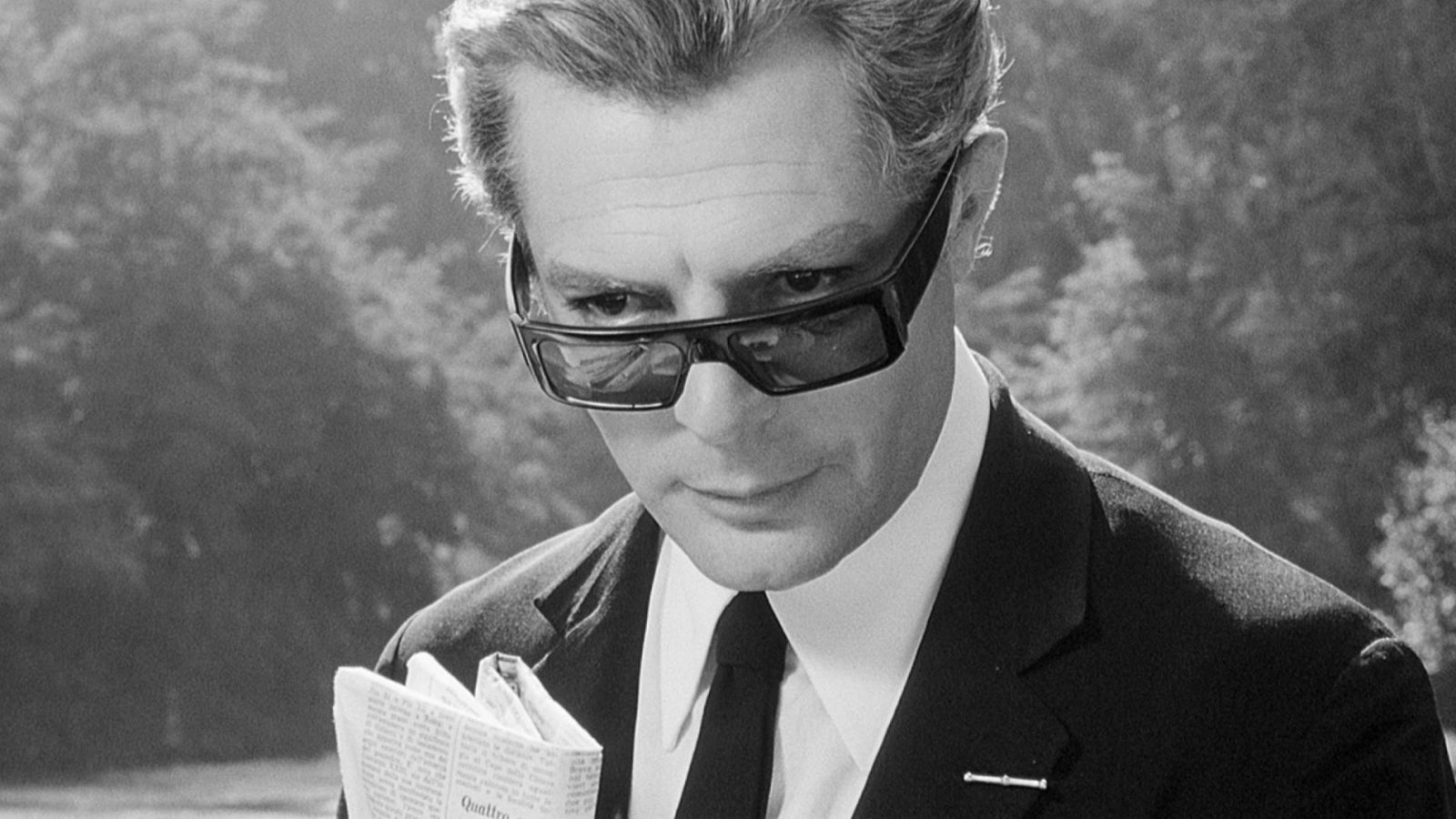
8 ½ is an intimately movie about film making and directors, specifically Fellini’s own personal experiences. Marcello Mastroianni stars as Guido Anselmi, a famous Italian director who is struggling to make his next film, which is some sort of science fiction tale. Guido’s troubles stem from his lack of inspiration and focus, constantly flashing back to formative events in his past and fantasizing about the present. He keeps stringing along his producers and actors without knowing where he wants to take the film.
This identity crisis, along with increasing marital problems, form the plot and conflict in this existential and powerful masterpiece. The title refers to the 8 films and one collaboration that Fellini had completed before making 8 ½, with the character of Guido being representative of Fellini himself and his troubles with film making.
It is semi-autobiographical in that many of the stories and flashbacks shown are similar to Fellini’s own experiences. Because of his deep connection, 8 ½ is also one of Fellini’s most personal films and most focused in terms of purpose and symbolism. It also is the most imaginative of his early works, featuring many bizarre and fantastical dream and memory sequences.
Guido is a man who lives through his imagination and memories, and although his friends and family want him to succeed, he has no drive to follow their wishes. His character is one of the greatest insights into the mind of any director of film and the process and dreams behind his creation. This award winning film about freedom and creativity, as well as the personal struggles of an artist, is one of the greatest films about film making and should be seen by every fan of cinema.
15. The Leopard (Luchino Visconti, 1963)
The Leopard is one of Visconti’s most acclaimed films of his career. Burt Lancaster stars as the aging Prince, Don Fabrizio of Salina in this historical drama set during the period of revolution and unrest in 1860s Italy.
Corbera, also known as The Leopard, represents the last of the old age of aristocracy in Sicily, who is slowly watching as his way of life crumbles away. His nephew Tancredi, played by Alain Delon, is conversely symbolic of the revolution and the new generation taking over. Also starring Claudia Cardinale, the film is a slow meditation on the fading nobility and the tragic character of The Leopard.
Gorgeously filmed and beautifully designed, the camera itself shows the faded glory of the aristocratic society in Sicily. Lancaster also gives a deeply intimate performance, resigned and depressed to his fate. The film, uncut, lasts over three hours but its slow, reflective atmosphere is filled with emotion and tensions between the two generations.
The Leopard is one of Visconti’s most personal films, addressing his family’s roots as nobility and the clash with his Communist beliefs. As much a political message as it is a beautiful work of art, it is a must see for all fans of Italian cinema.
